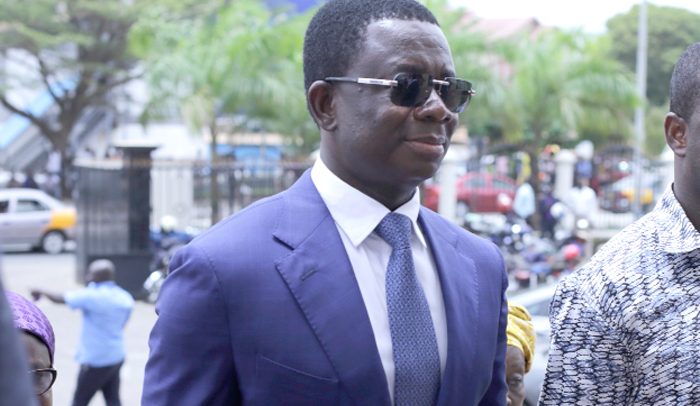The Supreme Court has dismissed an attempt by former Chief Executive Officer of Ghana Cocoa Board (COCOBOD), Dr. Stephen Opuni, who is standing trial for causing financial loss to the state, to remove the judge trying the case.
The court yesterday dismissed an application for certiorari to quash the proceedings of the trial court as well as another one seeking to prohibit the judge from continuing to hear the matter.
According to a five-member panel of the Supreme Court presided over by Chief Justice Kwasi Anin-Yeboah and assisted by Justices Jones Dotse, Sule Gbadegbe, Nene Amegatcher and Getrude Torkornoo, the applications lack merit and are not supported by the fact of the case and were therefore rejected.
Main Trial
Dr. Opuni and businessman Seidu Agongo are before an Accra High Court charged with causing financial loss of over GH¢271 million to the state in the COCOBOD fertilizer case.
Samuel Codjoe, counsel for Dr. Opuni, had tried to remove the trial judge, Justice Clemence Honyenugah, a Supreme Court judge sitting with additional responsibility, from hearing the case on grounds of alleged bias towards his client.
Mr. Codjoe was pushing for the trial judge to recuse himself from the trial for saying at a traditional programme where he is paramount chief that the current President had done well with the Free Senior High School (SHS) programme which has bridged the educational gap between the rich and the poor in the country.
The lawyer had argued that the judge had openly campaigned for the President through his comments hence compromising his integrity to fairly hear the case before him which he said is political because of the interest, he claims, the current government has in it.
The trial judge dismissed the application stating that the court was hearing the matter based on the facts before it and that the trial had nothing to do with politics.
The lawyer then filed an appeal at the Court of Appeal and attempted to stay the proceedings at the trial court.
The application for stay of proceedings was dismissed by the trial judge saying it did not raise any special circumstance for which the trial should be put on hold.
The court also held that counsel for Dr. Opuni failed to use the appropriate means of addressing the change of a judge in the matter when necessary, by petitioning the Chief Justice but rather chose to file an application asking him to recuse himself.
Dr. Opuni then repeated the application for stay of proceedings at the Court of Appeal and urged the trial court to stay its proceedings pending the determination of the appeal but that was refused by the appellate court and later dismissed the application for stay of proceedings as well.
He then filed a writ at the Supreme Court seeking to stop the judge from continuing to hear the matter as well as a certiorari to quash the proceedings of June 26, 2020 on grounds that the court did not give them the seven-day automatic stay of proceedings after dismissing their application.
Moving the motion before the Supreme Court yesterday, Mr. Codjoe stated that the trial judge acted in excess of his jurisdiction when he granted an adjournment which was not up to the seven-day automatic stay permitted per the rules of court because their appeal was scheduled for July 2 and the judge adjourned the matter to July 6, 2020.
He added that that judge breached 27 (1) and 27 (3) of C.I. 19 by not granting them the seven-day automatic stay.
The application was opposed by Stella Ohene Appiah, a Principal State Attorney, who said the mere filing of an application for stay of proceedings does not automatically stay the proceedings because the trial judge has the discretion to decide whether or not to stay the proceedings.
The Supreme Court panel then dismissed the applications, holding that the trial judge gave the applicant more than the stipulated seven days and did not continue to hear the matter to the detriment of Dr. Opuni and also dismissed the application seeking the removal of Justice Honyenuga and asked him to continue hearing the case.
BY Gibril Abdul Razak

